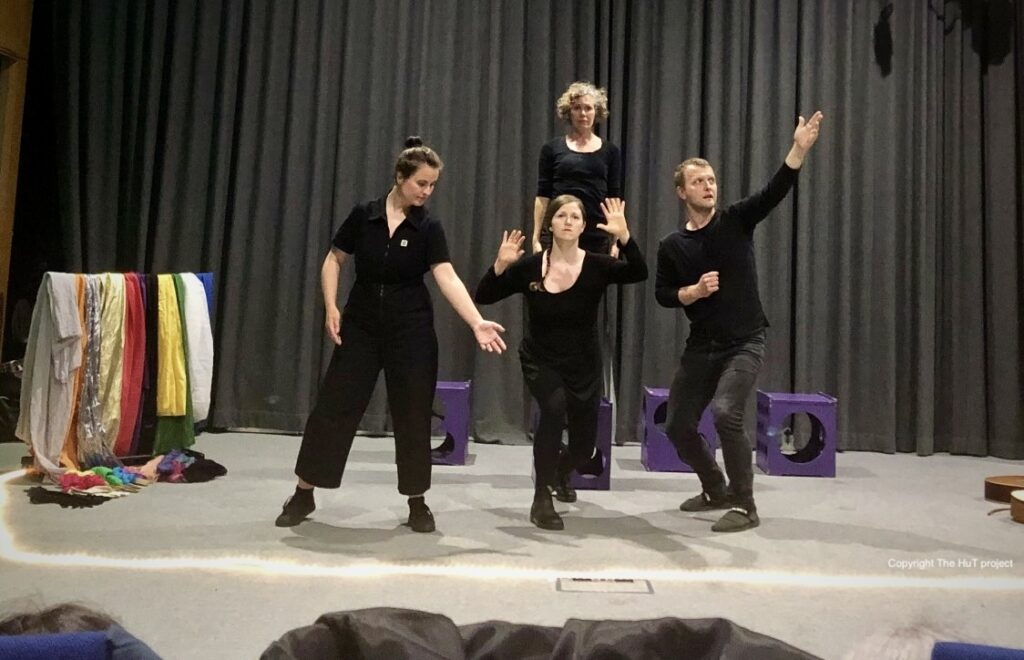
Unveiling Disaster Risk Reduction Innovations: Insights from our sister European Projects
In recent months our sister projects developed several interesting initiatives; a scene-art approach for disaster risk reduction, an investment guide, stakeholders consultations and new papers.
The Human-Tech Nexus – Building a Safe Haven to cope with Climate Extremes – the HuT
- Mitigating Losses: Integrating Science and Art for Disaster Risk Reduction
Over 60,000 lives were lost due to natural hazards in the first half of 2023, with escalating risks from global warming. The HuT introduced a “science-art” approach to disaster risk reduction. ‘Breaking the silos’ through theatre-science integration emerges as a tested strategy for reducing losses and optimising disaster risk management. Read article here.
WaterLANDS – Water-based solutions for carbon storage, people and wilderness
- SERE 2024 – 14th European Conference on Ecological Restoration
In August 2024, WaterLANDS partners will participate in SERE2024, the international conference organised by the European Chapter of the Society for Ecological Restoration (SERE). The WaterLANDS project will present its findings and host a joint session with MERLIN, Rest-Coast, and SUPERB project on landscape-scale restoration. Find more information about WaterLANDS’s participation at the 14th European Conference on Ecological Restoration here.
- Peatland landscapes represent critical investment opportunity
In January 2024, EU Horizon 2020 WaterLANDS project, Landscape Finance Lab, and Climate Catalyst jointly launched the ‘Investing in Peatlands‘ publication, offering guidance for nature-focused investors and encouraging growth in the peatland finance sector.
- How could Europe restore its nature? Exploring EU Nature Restoration Law
In 2024, the European Parliament finalised the EU Nature Restoration Law (NRL), targeting biodiversity loss reversal. An international team led by the University of Duisburg-Essen and scientists from University College Dublin (UCD) assessed its implications in a research paper published on Science. Check out How could Europe restore its nature? New paper published by Restoration Cluster explores EU Nature Restoration Law.
- Integration of Diverse Disciplines is Essential for Large-scale Wetland Restoration
In October 2023, the WaterLANDS team met at Wetlands International Headquarters in the Netherlands to discuss integrating various project disciplines. WaterLANDS seeks to restore degraded wetlands, not only for environmental benefits but also for social and economic gains for communities relying on wetlands. The workshop aimed to identify synergies for ongoing project activities.
PARATUS project – Promoting disaster preparedness and resilience by co-developing stakeholder support tools for managing the systemic risk of compounding disasters
- A comparative impact chain analysis of two earthquakes (1999 and 2023) in Turkey
Scientists at PARATUS have examined the impact and evolution of disaster management practices following seismic events in Turkey in 1999 and 2023, using impact chain analysis to identify vulnerabilities, advancements, and strategies for enhancing disaster resilience and preparedness. Check out the publication.
- The effects of global warming on Caribbean precipitation
PARATUS experts predict less rain in the Caribbean by the end of the century due to changes in Pacific Ocean patterns. Uncertainties remain about the accuracy of the predictions. Check out the publication.
KNOWING project – How to deal with climate change
How can stakeholders contribute to creating better models? In its vision workshops, KNOWING uses its expertise for the interaction of climate adaptation measures.
As MYRIAD-EU continues to foster collaboration and information dissemination among sister projects dedicated to multi-hazard risk reduction, stay tuned for further updates and developments in this crucial field.
+ Do you want to contribute? Send us your project updates at info@myriadproject.eu
